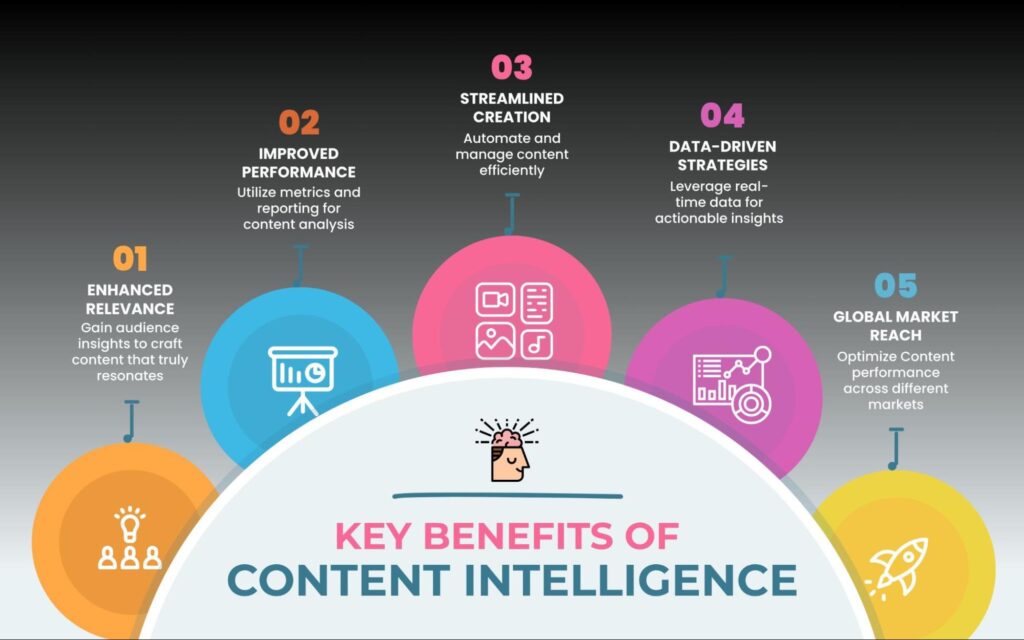What is content intelligence? It’s about using the power of artificial intelligence and big data to transform content into a strategic asset. Content intelligence aids marketers in crafting, managing, and evaluating content by providing insights that are often impossible to gather manually. This involves analyzing vast amounts of data from various content types—be it text, image, or video—to draw actionable insights that guide content strategies and improve decision-making.
Content intelligence platforms serve as an invaluable tool for content creators. By integrating with advanced Digital Asset Management (DAM) solutions, these platforms ensure efficient content operations and elevate content performance across global markets. With content intelligence, brands are empowered to create relevant content that resonates with their audience, automating workflows, and driving measurable results.
Why Does Content Intelligence Matter?
Content intelligence enhances your content with insights and strategy. Leveraging AI and machine learning, it analyzes data to uncover what content is effective, why it resonates, and how to enhance it. This goes beyond mere numbers; it’s about making your content more intelligent and impactful.
The Role of AI and Data in Content Decision-Making

By analyzing vast amounts of information, AI provides insights that empower teams to create more relevant, impactful, and effective content strategies. Instead of relying on guesswork or manual analysis, businesses can harness AI and data to make smarter, faster decisions.
How AI and Data Enhance Content Decision-Making:
- Audience Insights: AI analyzes customer behavior, preferences, and demographics to help teams understand what content resonates with specific audiences.
- Predictive Analytics: Advanced algorithms forecast trends and content performance, enabling proactive adjustments to strategies.
- Content Optimization: AI continuously evaluates content effectiveness, suggesting improvements in tone, format, or delivery timing to maximize impact.
- Data Integration: Centralized systems aggregate data from multiple sources, providing a holistic view of audience engagement and content effectiveness.
By integrating AI-driven insights into their workflows, businesses can move beyond intuition and make decisions rooted in real-time, actionable data. Every piece of content aligns with audience expectations, optimizes resources, and delivers measurable results.
Why Businesses Need Content Intelligence Today
Today’s businesses face increasing pressure to create content that engages and drives meaningful outcomes. Traditional approaches often fall short, as they lack the agility and precision required to meet evolving customer expectations. Content intelligence fills this gap by leveraging data and AI to provide actionable insights that inform every stage of the content lifecycle. From identifying audience preferences to predicting performance, content intelligence enables businesses to deliver more relevant, impactful, and timely experiences.

Key Benefits of Content Intelligence
Content intelligence helps businesses understand their audience, streamline operations, and make data-backed decisions. Let’s explore the key benefits it offers:
Enhancing Content Relevance and Impact
What is content intelligence if not a way to ensure every piece of content resonates with your audience? By analyzing audience data and behaviors, content intelligence allows brands to tailor their messaging to specific preferences and needs. Precision ensures that content is not just seen but actually engaged with, driving deeper connections and more meaningful interactions.
Key ways content intelligence enhances relevance:
- Identifying the topics and formats that matter most to your audience.
- Personalizing messaging for different audience segments.
- Delivering the right content at the right time across the most effective channels.
When content feels relevant and valuable, it has a greater chance of leaving a lasting impact and inspiring action.
Streamlining Content Creation and Distribution
Creating and distributing content at scale can be a complex, resource-intensive process. Content intelligence simplifies this by automating repetitive tasks, optimizing workflows, and guiding teams toward more strategic decisions. Whether you’re developing a blog, launching a campaign, or managing a content library, content intelligence ensures every step is efficient and effective.
How content intelligence streamlines workflows:
- Automating content tagging and organization for easier management.
- Suggesting content formats or channels based on performance data.
- Reducing redundancies with smarter resource allocation.
By taking the guesswork out of content operations, teams can focus on creativity and innovation while maintaining consistent delivery across channels.
Driving Data-Backed Content Strategies
Gone are the days of relying on intuition to shape your content strategy. Content intelligence leverages robust analytics to guide your decisions, ensuring every piece of content aligns with measurable goals. From identifying what works to pinpointing areas for improvement, data-driven strategies maximize ROI and minimize wasted effort.
Why data-backed strategies matter:
- Gain clarity on which campaigns drive the highest engagement.
- Understand audience behaviors and preferences for better targeting.
- Continuously improve by analyzing real-time performance metrics.
With content intelligence, businesses can confidently create strategies that align with audience needs and deliver consistent, measurable results.

How Content Intelligence Works in Practice
Understanding how content intelligence works in practice reveals its true potential to transform your content strategy. Content intelligence leverages data and AI to inform smarter decisions, automate workflows, and optimize content performance in real time. By seamlessly integrating into your existing processes, it enables you to deliver content that resonates with your audience while driving measurable outcomes. Let’s explore how content intelligence operates across key areas to make this possible.
Leveraging Audience Insights to Inform Strategy
Content intelligence transforms raw data into actionable insights, helping businesses understand their audience on a deeper level. By analyzing behaviors, preferences, and engagement patterns, teams can create strategies that align with what their audience truly wants.
For instance, a retail company might discover through data analysis that their customers engage more with video content showcasing product use cases. Armed with this knowledge, they can shift resources to produce more engaging videos, driving higher conversion rates.
Use Case: A global fitness brand used audience insights to identify a preference for quick, digestible workout tips over long-form blog content. By pivoting their strategy to focus on short-form video tutorials, they increased social media engagement and drove more traffic to their e-commerce store.
Automating Content Optimization with AI
One of the most powerful aspects of content intelligence is its ability to automate optimization. AI continuously evaluates content performance and makes recommendations to enhance its effectiveness, such as refining headlines, adjusting publishing times, or suggesting keywords. Real-time adaptability ensures that content is always at its best, maximizing its impact without requiring constant manual adjustments.
Use Case: A software company integrated AI-powered content optimization into its email campaigns. By automating subject line testing and adjusting send times based on user engagement, it saw a 25% increase in open rates and a 15% boost in click-through rates—results that were impossible to achieve with manual efforts alone.
Tracking Performance to Improve Outcomes
Content intelligence provides robust tracking capabilities, enabling businesses to measure the success of their strategies and identify opportunities for improvement. From campaign metrics to individual content performance, these insights allow teams to fine-tune their approach and drive better results. By continuously monitoring outcomes, businesses can stay agile and respond quickly to changing audience needs.
Use Case: A leading consumer goods company tracked the performance of its seasonal campaigns using detailed analytics. When one product line underperformed, they identified that the messaging wasn’t aligned with customer preferences in a key demographic. By tweaking the messaging mid-campaign, they reversed the trend, resulting in a 20% increase in sales.
By integrating these capabilities, content intelligence provides data to empower teams to act on it effectively, ensuring every piece of content contributes to broader business goals.
Challenges in Implementing Content Intelligence
While content intelligence offers numerous benefits, implementing it can present challenges. Here, we’ll explore some key problems and how to overcome them.
Overcoming Data Silos and Integration Barriers
One of the biggest challenges in implementing content intelligence is consolidating data from multiple systems. When data is spread across disconnected tools and platforms, it becomes difficult to gain a clear, unified view of customer behavior and content performance. Lacking integration can hinder your ability to answer the question: “What is content intelligence, and how can it drive real results?”
How to break down silos and integrate data effectively:
- Utilize centralized systems that bring all content and data into one accessible hub.
- Implement APIs and integrations to connect disparate platforms seamlessly.
- Leverage automation to unify and categorize data in real time.
These solutions ensure your data is actionable, enabling smarter content decisions and better outcomes.
Navigating the Complexity of AI-Driven Tools
AI and machine learning can feel overwhelming, especially for teams unfamiliar with advanced technologies. From setting up the tools to understanding their insights, the learning curve can slow down adoption and effectiveness. Without proper support, teams may underutilize the potential of AI, leaving valuable insights untapped.
Solutions like intuitive dashboards, automated recommendations, and training resources make it easier for teams to adopt and excel with AI-driven tools. By focusing on user-friendly interfaces and guided workflows, businesses can empower their teams to harness the full power of AI without being bogged down by complexity.
Measuring Success in Content Intelligence
Implementing content intelligence is only half the battle—measuring its success is another challenge. Many teams struggle to define and track the right metrics to gauge how well their content intelligence strategies are performing. Without clear benchmarks, it’s hard to determine whether efforts are translating into meaningful results.
Key metrics to track include:
- Engagement rates (e.g., clicks, views, and shares).
- Conversion rates tied directly to personalized content.
- Efficiency improvements in content creation and delivery workflows.
By setting up robust analytics and performance tracking tools, businesses can clearly see how content intelligence drives ROI and continuously optimize their strategies for greater impact.
Real-World Applications of Content Intelligence

Rather than simply a theoretical concept, content intelligence is a practical tool that optimizes how businesses create, manage, and deliver content. By using data and AI, companies can enhance personalization, improve campaign performance, and streamline operations across their entire content lifecycle. Let’s explore some key ways businesses are leveraging content intelligence to achieve real-world results.
Personalization Across Channels
One of the most impactful uses of content intelligence is delivering personalized experiences across multiple channels. By analyzing customer behavior and preferences, businesses can tailor their messaging for social media, email, websites, and more.
For example, an e-commerce brand can use content intelligence to recommend products based on browsing history and past purchases, ensuring each interaction feels relevant and timely. The company can boost engagement and build stronger customer loyalty.
Optimizing Campaign Performance
Content intelligence takes the guesswork out of campaign management by providing actionable insights that drive better outcomes. AI-powered tools can predict which content formats, messaging, and channels will perform best for a specific audience.
For instance, a media company running a multi-platform campaign can use these insights to allocate budgets more effectively, focusing on high-performing assets and eliminating underperforming ones in real time.
Scaling Content Operations with Intelligence
As businesses grow, managing content at scale becomes increasingly complex. Content intelligence automates key workflows like tagging, categorizing, and distributing content.
For example, a global technology firm can use content intelligence to ensure that localized marketing materials are automatically aligned with regional preferences, reducing manual effort while maintaining quality and consistency. Scaling efficiently allows businesses to focus on creativity and strategy instead of operational bottlenecks.
By applying content intelligence in these practical ways, businesses can maximize the impact of their content strategies, enhance efficiency, and deliver experiences that truly resonate with their audiences.
Revolutionize Your Content Strategy With AI-Powered Solutions
Content intelligence is the foundation of smarter, data-driven content strategies that deliver measurable results. By harnessing the power of AI and analytics, brands can unlock deeper audience insights, create highly personalized experiences, and streamline their operations. From optimizing campaigns to scaling content production, content intelligence empowers businesses to build stronger connections and drive meaningful outcomes.
Aprimo provides the tools you need to make content intelligence a core part of your approach. With capabilities that centralize data, automate workflows, and deliver actionable insights, Aprimo helps you align your content with your audience’s needs and your business objectives. Whether you’re looking to optimize your current efforts or scale your strategy, Aprimo is designed to meet the challenges of modern content operations.
Book a demo today and see how Aprimo can transform your content strategy, helping you create impactful, data-driven experiences that resonate with your audience and drive results. Let’s redefine what your content can achieve.


